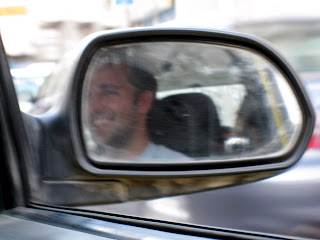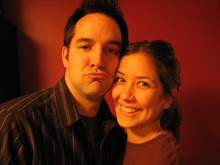skip to main |
skip to sidebar
 Allow me to introduce you to the new voice telling the story of West / Middle East dynamics. His name is Samir and he drives a taxi in Amman, Jordan.
Allow me to introduce you to the new voice telling the story of West / Middle East dynamics. His name is Samir and he drives a taxi in Amman, Jordan.
It was Samir who I happened to flag down for my cross town trip the other day. I quickly realized that here was a man--a small, smiley man--who actually spoke less English than I speak Arabic. That's not saying much, but time for me to practice. With few words, we covered the basics about our names, homes, families, etc. Samir, a Palestinian, then took it to the next level by pointing to his prayer rug and asking me if I am a Muslim and whether I believe in one God. I knew he wouldn't understand much, but I responded by saying something to the effect of, "Well, yes, one God, but I follow Jesus."--half in Arabic, half in English. I freaked out and almost jumped out of the car when he then flashed a knife. No, I'm lying, he did not do that! Sorry about the scare. But doesn't our perspective tell us to half expect a story like that? What Samir really did was continue to smile and use his hands and Arabic to communicate, "You and me, friends, brothers." Beyond that, he spent the remainder of our time together in the taxi trying to make me understand that any Arab-American conflict (Israel was his example) is among the governments, but that between the people there are no problems. Accordingly, we smiled again and shook hands fondly before I got out of the car. Once more before he sped off, he waved out the window to me: "Bye Joe."
It's slightly unrealistic to think that everyone everywhere expresses the sentiment of Samir's heart, but maybe, instead of driving a taxi, he should be using his voice to influence more people in the global community.
 Although we remember with fondness our rainy days in New Zealand, we have since come a long way in terms of time, distance, and weather. We are happy to report that it has been exactly two months (May 19th in Rome) since we last experienced even a cloudy day. Yes, it's been quite "enlightening" to live life sunny side up. In other news, we're also marking exactly five months (February 19th) since we left home, plus we're halfway through our time in Jordan--less than seven weeks left before we land in San Diego, California, USA! How do we feel about that? Ask us in seven weeks. Next up is a highly anticipated visit to our neighbor, Israel. We've pushed it back twice now due to an overall unwillingness to deal with any sort of travel logistics, but sooner or later, we'll make it.
Although we remember with fondness our rainy days in New Zealand, we have since come a long way in terms of time, distance, and weather. We are happy to report that it has been exactly two months (May 19th in Rome) since we last experienced even a cloudy day. Yes, it's been quite "enlightening" to live life sunny side up. In other news, we're also marking exactly five months (February 19th) since we left home, plus we're halfway through our time in Jordan--less than seven weeks left before we land in San Diego, California, USA! How do we feel about that? Ask us in seven weeks. Next up is a highly anticipated visit to our neighbor, Israel. We've pushed it back twice now due to an overall unwillingness to deal with any sort of travel logistics, but sooner or later, we'll make it.
On a more serious note, please take a short time to know and remember a special little guy by clicking here. Our nephew's cousin, Jackson, is barely six months old, and this Thursday he'll be undergoing open heart surgery. Please pray.
Sorry, no fun videos nor big stories today. (Although, Wanida did insist on one picture below.) Instead, a thought provoking, question raising, answer seeking post for your consideration. Fun!
Generation after generation, the relationship between the West and the Middle East has been increasingly steeped in issues of oil, politics, military moves, the media, and Israel-Palestine. I'll risk a generalization and say that now, post-9/11, the average American's interest in and attitude toward the Middle East have deteriorated, except of course for questions of our own security and prosperity. Are we fully aware, though, of just how far we've come in our awareness and understanding of the Arab Muslim world--or should I say, just how far we have to go? In an article written in 1980 (that would have been just as relevant if written yesterday), one man seems to have summarized it.
Edward Sa'id (Sa-eed) was a Palestinian American author/writer and Professor of English and Comparative Literature at Columbia University before he died of Leukemia in 2003. Born in Jerusalem in 1935, he described himself as a "Christian wrapped in a Muslim culture", and he was an outspoken supporter of Palestinian rights. Sa'id is best known for his book Orientalism (1978), but two years later he wrote an article in The Nation in which he analyzed the West's perspective of the Middle East:
"So far as the United States seems to be concerned, it is only a slight overstatement to say that Moslems and Arabs are essentially seen as either oil suppliers or potential terrorists. Very little of the detail, the human density, the passion of Arab-Moslem life has entered the awareness of even those people whose profession it is to report the Arab world. What we have instead is a series of crude, essentialized caricatures of the Islamic world presented in such a way as to make that world vulnerable to military aggression."
Big statements. Any thoughts?

 I know what you're thinking: "Nice legs." To focus on those, though, is to miss our Dead Sea story, so stop staring and keep reading. Here's the story: We went to the Dead Sea. Not enough of a story? Let's review, then, some of the fun facts that make the Dead Sea quite an interesting and unique place. From Amman, its shores are only about 30 minutes away by car, and doing the drive involves descending from an altitude of about 2,500 feet to the lowest point on the surface of Earth, 1,378 feet below sea level. The waters of the Dead Sea are the second saltiest in the world with approximately 30 percent salinity, making it about eight and a half times saltier than the ocean. What this means is that floating on the surface is probably like no other swimming experience you've ever had; bring a book, bring a drink, but don't bother bringing a raft. Bobbing in the water is a strange sensation, especially because the water itself feels different--slimy and slippery like baby oil. Everything about the Dead Sea and the climate of the region, from the minerals to the sunshine to the temperature to the humidity to the barometric pressure, is supposed to be therapeutic and beneficial to the human body. It should come as no surprise, then, that the two of us have been transformed by our visit into superhumans with many new and unnatural powers. Now that's a good story!
I know what you're thinking: "Nice legs." To focus on those, though, is to miss our Dead Sea story, so stop staring and keep reading. Here's the story: We went to the Dead Sea. Not enough of a story? Let's review, then, some of the fun facts that make the Dead Sea quite an interesting and unique place. From Amman, its shores are only about 30 minutes away by car, and doing the drive involves descending from an altitude of about 2,500 feet to the lowest point on the surface of Earth, 1,378 feet below sea level. The waters of the Dead Sea are the second saltiest in the world with approximately 30 percent salinity, making it about eight and a half times saltier than the ocean. What this means is that floating on the surface is probably like no other swimming experience you've ever had; bring a book, bring a drink, but don't bother bringing a raft. Bobbing in the water is a strange sensation, especially because the water itself feels different--slimy and slippery like baby oil. Everything about the Dead Sea and the climate of the region, from the minerals to the sunshine to the temperature to the humidity to the barometric pressure, is supposed to be therapeutic and beneficial to the human body. It should come as no surprise, then, that the two of us have been transformed by our visit into superhumans with many new and unnatural powers. Now that's a good story!
 Allow me to introduce you to the new voice telling the story of West / Middle East dynamics. His name is Samir and he drives a taxi in Amman, Jordan.
Allow me to introduce you to the new voice telling the story of West / Middle East dynamics. His name is Samir and he drives a taxi in Amman, Jordan.


